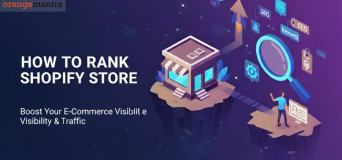
Here’s what you will learn:
This blog post will offer a step-by-step guide to starting and running an online business. Starting from idea generation to technology selection to online store management and maintenance, we will discuss everything. Read on to know everything you need to start and run an eCommerce business.
More and more people are embarking on a business journey with online commerce. The pandemic-era has made this a more pressing and tempting business choice at the same time. Starting and sustaining an eCommerce business, however, is easier said than done. You would need the right business idea, suitable eCommerce website development, and a failure-proof strategy, among many other things. If you are looking for a comprehensive guide offering tips to start an eCommerce business, you have reached the right place.
Table of Contents
Significance of Ecommerce Business
Driving Economic Growth
eCommerce has an essential role in driving economic growth by boosting trade and commerce on a global level. It enables businesses of all sizes whether startup or established to reach new markets, expand their reach, and generate revenue streams breaking geographical boundaries.
Fostering Innovation
eCommerce brings innovation for business groups by encouraging development of new products, services, and business models. They are tailored to the needs and preferences of online buyers. You can reach to an eCommerce software development company for experimentation and iteration with the platform. It allow businesses to adapt and evolve in response to rapidly growing market dynamics and consumer needs.
Engaging Customers Worldwide
eCommerce biggest advantage for business groups is the elimination of geographical barriers. This brings connect with customers worldwide regardless of their location. It brings real-time access to a wide range of products and services, facilitating them to shop conveniently in a more personalized way from the comfort of their preferred location.
Once you are aware of the eCommerce significance, it is the time to know the best approach for starting online selling business.
Tips for Starting an eCommerce Business
The eCommerce business journey starts, well, before you launch your business. Every successful online business demands tremendous research early in your business planning process —whether it’s eCommerce integration or online store development. You must already be aware that the competition is astronomically high. The pandemic-induced digital surge has made the competition even more intense. So, to succeed in such a market, you need to take every step strategically.
Step 1: Research your business model & the target market
Consider your online business as a crucial investment. Right from the beginning. Since you don’t make crucial investments in a haste, the same applies to your eCommerce plan. eCommerce is anything but one-size-fits-all. You need to understand that your online business model is unique. So, treat it as such. From how you plan to market the business to managing inventory and shipping, you need to plan everything. And that requires extensive research. Talking to eCommerce consultants would make things easier for you. Look for an eCommerce development company that offers cost-efficient consulting services.
Step 2: Validate the target market and business idea
The next step is identifying your target market and what kind of products you would be selling. Before finalizing your offerings, however, it’s important to understand the buyer personas you’re targeting. Start with a smaller number of well-defined product ideas and expand gradually. That way you averse the risks of bigger financial losses. Before investing money in products, you need to evaluate them elaborately. You could use methods like drop-shipping.
Step 3: Know your competitors
Competitor analysis is critical in every kind of business. No less so in digital commerce. The presence of competition also validates the niche you have selected. While analyzing competition, try to understand them categorically. For instance, you must know who your direct competitor is and who are top players on the market. You can learn a lot from your competitors. So, analyze them and observe them closely. Note down the things you like and dislike about them. Also, try to know what kind of eCommerce platforms they are using. For example, if a competitor is using Magento development, how it’s benefitting them.
Step 4: Create a brand name and register your business
In a world dominated by brand identifies and ruthless competition, you cannot succeed without a brand name. Create a brand name and logo that reflects your business model. Just make sure that your target audience the message you send through the brand image. Register your business name and company name to get legal protection and tax benefits, among other things. Also, apply for the necessary business license, permits, and other certifications to operate without any legal obstacles.
Step 5: Build your online store
This is one of the most significant steps. What kind of online store you build determines a lot about the long-term journey of your eCommerce business. If you are planning to build a customized online store, choosing the right eCommerce development company is critical. The availability of a staggering number of eCommerce solutions vendors may easily overwhelm you. So, the best approach is to make an informed decision based on research and comparison.
What kind of eCommerce platform you pick greatly impacts the store’s performance and its profit. Choose an eCommerce platform that best suits all your business needs. For instance, if you don’t want to choose hosted eCommerce, Shopify website development would meet your requirements. For fully customized B2B and B2C eCommerce, Magento development services are the most recommended ones. Magento is most popular among medium enterprises and large companies.
While building the online store, you need to keep a few key things on the top of your mind. SEO-friendliness of the store, a mobile-optimized design, and secure payment gateways are some of the most important factors in eCommerce design.
Step 6: Showcase your products
Only the right approach to displaying your products on the store will get you the right audience. And only the right audience will convert to paying customers. Make sure that every product gets a well-written product description and visually captivating images. Besides, the product pages should be custom-built to create an immersive experience. Make reviews and testimonials a key element of the product pages. Be strategic about how you display price in product pages.
Step 7: Attract customers with SEO & UX design
Doing all the above steps won’t get you anywhere if you cannot ensure the right visibility of your store on the limitless world of digital commerce. As noted very early in this post, the competition is more intense than ever. That means you need to stand out to get the right audience in your store. SEO plays a crucial role. The most successful online commerce operators meticulously manage their digital marketing. Be it content curation, pay-per-click, or social media marketing, you need to be strategic about everything that affects the visibility of your online store.
Creating a loyal base of customers one of the best ways to keep your business ahead. Create loyalty programs, gifts cards, coupons, etc. to keep your customers engaged and loyal.
Potential Benefits and Opportunities of Starting an eCommerce Business
Global Reach
Unlike old approach of selling products from brick-and-mortar stores, eCommerce businesses can engage prospects from all corners of the world. With the power of the internet, it has become easy and fast to sell your products or services to prospects regardless of geographical boundaries.
Low Overhead Costs
Compared to building and setting up a physical outlet, launching an eCommerce marketplace development requires less resources and costs. You can save on operational cost including rent, utilities, and staffing, making it a better choice for aspiring entrepreneurs with limited investment.
Flexible Work Environment
Operating an eCommerce business provides desired flexibility including location and working hours. You can run and monitor your online business from across the globe with an internet connection. Whether you are at your home, a coffee shop, or traveling, no limit to accessibility. This flexibility supports a healthy work-life balance that serve your needs.
Scalability
Having eCommerce website for your business brings opportunities for rapid scalability. As your business expands, you can easily add different product offerings, reach new markets, and grow sales number without the challenges of physical space. With the right guidance from eCommerce integration services, you can scale your business to meet growing demand and grow profits.
24/7 Availability
Unlike brick-n-mortar stores having fixed operating hours, your eCommerce business have 24/7 operations. Customers can buy or explore the website at their convenience, allowing you to generate sales around the clock without facing troubles of operating hours and limitations of time zones.
Targeted Marketing
eCommerce platforms are integrated with robust tools for performing targeted marketing and customer segmentation. You can perform data analytics to understand your customers’ preferences, behaviors, and buying patterns, allowing you to customize marketing efforts for maximum growth.
Direct-to-Consumer Sales
By selling straight to consumers through your eCommerce platform, you can eliminate mediators like wholesalers or distributors. This supports greater control over pricing, branding, and customer relationships. Moreover, it results into higher profit margins and an improved shopping experience with personalized services.
Real-Time Data Insights
eCommerce business bring valuable data insights that can influence business decisions and ensure growth. Ranging from website analytics to customer feedback, you have liberty to optimize your products, marketing strategies, can gather actionable data and improve business performance.
Innovation and Experimentation
The digital model of eCommerce supports rapid innovation and experimentation. You can simply test new products, marketing tactics, and sales performance with minimal risk and investment. This agility ensures eCommerce businesses to address and adapt quickly to changing market trends and consumer behavior.
Community Building
eCommerce businesses bring opportunity to build a loyal community of customers and brand advocates. Adding engaging content, social media interactions, and personalized buying experience can build a sense of belonging and loyalty among your audience, grow number of repeat purchases and promote word-of-mouth referrals.
Wrapping up
Starting an eCommerce business is an intricate undertaking — one that demands strategic thinking and tech-savviness. But with the right approach and the right technology, you can achieve the desired goals. From envisioning a business idea to selecting the target audience and building an online store, everything requires a customer-focused approach. At OrangeMantra, an eCommerce app development company, our eCommerce consultants, software development specialists, and digital marketing experts help you launch an online store that attracts customers. From idea generation to tech development to post-deployment support, we stay with you throughout your journey.
FAQs
Q. How much does it cost to develop an eCommerce website?
The costs of building an eCommerce website vary widely, depending on your needs. If you need a simple online store with basic features and storefront, costs are comparatively lower. OrangeMantra offers reliable eCommerce development at a competitive price.
Q. What is an omnichannel eCommerce strategy?
An omnichannel eCommerce strategy is an approach to sales and marketing that provides customers with a fully-integrated shopping experience. It is achieved combining user experiences from brick-and-mortar to mobile-browsing, to social media everything in between.
Q. What is Magento eCommerce?
Magento is a PHP-based eCommerce development platform. It provides online merchants with a flexible online store, and great control over the look, content, and functionality. Magento is mainly used by medium enterprises and large companies worldwide.
Q. What is fully integrated eCommerce?
With a fully integrated eCommerce platform, your business can drive and track sales from a software dashboard. We can integrate your existing POS or ERP with your eCommerce website. Hire eCommerce developers from OrangeMantra to develop fully integrated eCommerce store.


